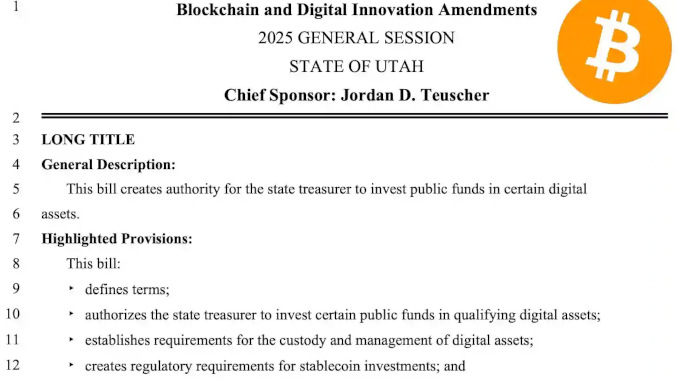
Utah State Legislature
Senate Revenue and Taxation Committee
Senator Daniel McCay, Chair
February 20, 2025
Testimony of Catherine Austin Fitts re:
Opposition to Budget Reserve Investment Provisions of
HB 0230S02 – Blockchain and Digital Innovation Amendments
Chairman McCay and Members of the Committee:
Thank you for the opportunity to address you today.
My name is Catherine Austin Fitts. I served as Assistant Secretary of Housing – FHA Commissioner in the first Bush Administration and as managing director and member of the board of Wall Street investment bank Dillon Read, where I led state and municipal bond offerings and served as a financial advisor to the Commonwealth of Pennsylvania. I publish the Solari Report and manage Solari Investment Screens.
I recently published two briefing papers for U.S. government leaders:
- What the States Can Do: Building the Legal and Financial Infrastructure for Financial Freedom
- Bitcoin Bailout: Why a Bitcoin Strategic Reserve Is a Bailout of the Big Boys
The Blockchain and Digital Innovation Amendments now before you contain a section qualifying digital assets for investment by four of Utah’s reserve funds:
- The State Disaster Recovery Restricted Account;
- The General Fund Budget Reserve Account;
- The Income Tax Fund Budget Reserve Account; and
- The Medicaid Growth Reduction and Budget Stabilization Account.
I strongly recommend this section of the amendments be removed.
These reserve funds are used by the state in periods of or in an event of emergency. These are often times when the economy or the financial markets may be under pressure or distressed as well. Consequently, the investment of such funds calls for assets which have a history of endurance and performance under such circumstances, are liquid even during periods of stress, and enjoy relative price stability.
The proposed amendments currently qualify digital assets with a market capitalization of $500 billion. The only digital asset with a market capitalization of $500 billion or more currently is Bitcoin. As described in detail in my Bitcoin Bailout briefing, Bitcoin is a highly speculative digital asset which is not liquid and experiences significant volatility. The recent issuance of Bitcoin exchange traded funds (ETFs) is improving liquidity in an investment designed to function like Bitcoin but has not been tested through market cycles.
Bitcoin functions like a Ponzi scheme. It serves no fundamental utilitarian purpose as a payment system on scale. Therefore, its price depends on the steady attraction of new investors looking for speculative profits. If state and federal governments can be persuaded to invest in Bitcoin, the price may continue to hold or rise for some time, long enough for the early investors to exit. However, once governments finish buying, there will be no new round of investors in such size to attract sufficient new purchases. As described in Bitcoin Bailout in more detail, Bitcoin does not provide an inflation hedge without the short-term rises provided by new investors into a speculative market.
This type of risk and price volatility is not appropriate for budget and tax reserves and stabilization funds.
Rather than put such funds in Bitcoin, Utah would be far better served to lower taxes. If you can afford this kind of speculation, better to return funds to taxpayers and let them choose to speculate as they see fit.
Stablecoins are crypto that try to maintain stable prices by pegging to another currency, commodity, or another crypto. There are currently no stablecoins with a market capitalization of $500 billion or more. However, it is possible that one or more stablecoins could grow to such size over the next 1-2 years.
While stablecoins are designed to function with far less price volatility than Bitcoin, and some do serve a payment system function, there are still no adequate quality controls assuring buyers that the coins are fully collateralized and the collateral is properly invested. In addition, there is no stable regulatory framework domestically and globally to ensure stablecoins are governed and managed with investors’ interests in mind.
Utah enjoys the highest bond ratings and an excellent reputation for sound financial management, making Utah a leader in state fiscal practices. If Utah were to adopt crypto investments for their rainy day and reserve funds, it would send an alarming message to the other states.
I recommend you remove these investment provisions from these amendments or vote no to move the bill out of committee.
Thank you for the opportunity to address you today.
Related Links:
What the States Can Do: Building the Legal and Financial Infrastructure for Financial Freedom
Bitcoin Bailout: Why a Bitcoin Strategic Reserve Is a Bailout of the Big Boys
Will Utah Build Its Economy or Lose Its Land?
views: 326
